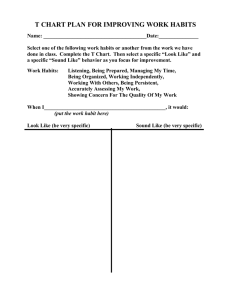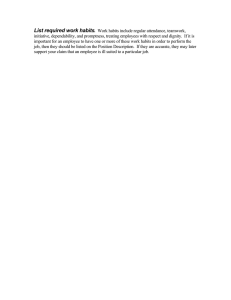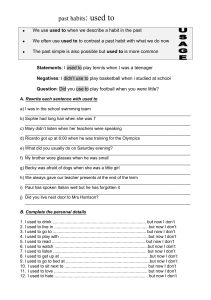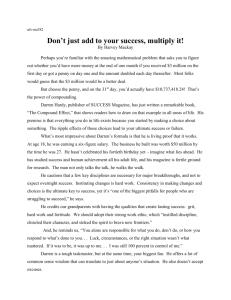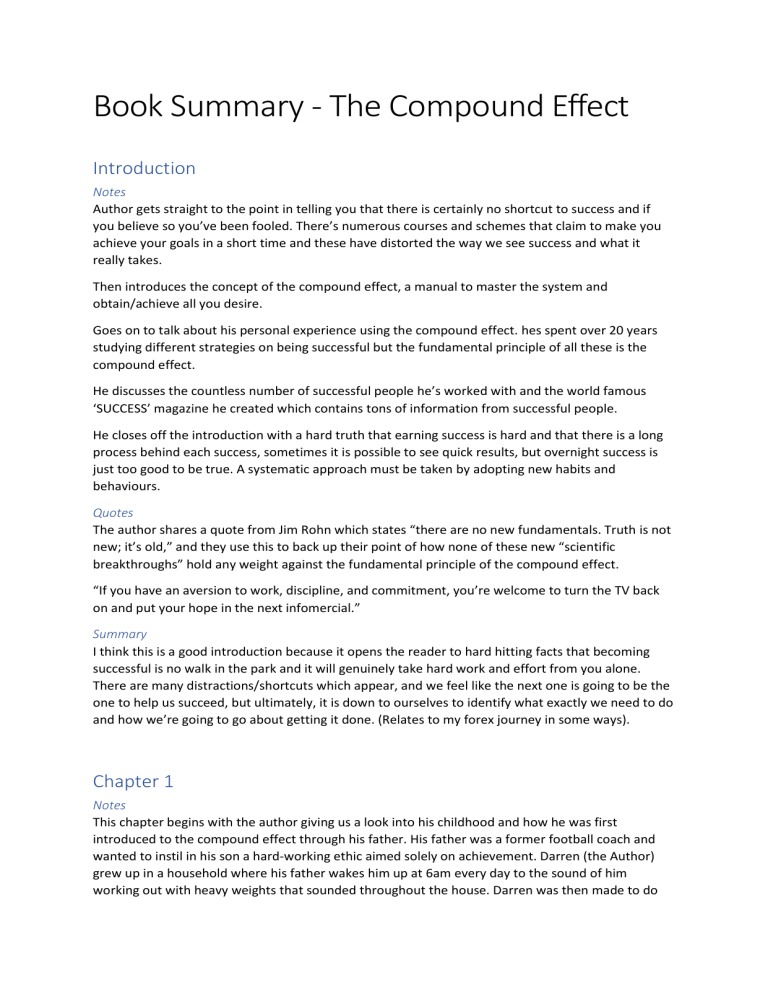
Book Summary - The Compound Effect Introduction Notes Author gets straight to the point in telling you that there is certainly no shortcut to success and if you believe so you’ve been fooled. There’s numerous courses and schemes that claim to make you achieve your goals in a short time and these have distorted the way we see success and what it really takes. Then introduces the concept of the compound effect, a manual to master the system and obtain/achieve all you desire. Goes on to talk about his personal experience using the compound effect. hes spent over 20 years studying different strategies on being successful but the fundamental principle of all these is the compound effect. He discusses the countless number of successful people he’s worked with and the world famous ‘SUCCESS’ magazine he created which contains tons of information from successful people. He closes off the introduction with a hard truth that earning success is hard and that there is a long process behind each success, sometimes it is possible to see quick results, but overnight success is just too good to be true. A systematic approach must be taken by adopting new habits and behaviours. Quotes The author shares a quote from Jim Rohn which states “there are no new fundamentals. Truth is not new; it’s old,” and they use this to back up their point of how none of these new “scientific breakthroughs” hold any weight against the fundamental principle of the compound effect. “If you have an aversion to work, discipline, and commitment, you’re welcome to turn the TV back on and put your hope in the next infomercial.” Summary I think this is a good introduction because it opens the reader to hard hitting facts that becoming successful is no walk in the park and it will genuinely take hard work and effort from you alone. There are many distractions/shortcuts which appear, and we feel like the next one is going to be the one to help us succeed, but ultimately, it is down to ourselves to identify what exactly we need to do and how we’re going to go about getting it done. (Relates to my forex journey in some ways). Chapter 1 Notes This chapter begins with the author giving us a look into his childhood and how he was first introduced to the compound effect through his father. His father was a former football coach and wanted to instil in his son a hard-working ethic aimed solely on achievement. Darren (the Author) grew up in a household where his father wakes him up at 6am every day to the sound of him working out with heavy weights that sounded throughout the house. Darren was then made to do numerous chores after school and there was no room to make any excuses. Now although this may seem like a harsh way of bringing up children, I feel like leading by example is something which children learn best from since they will always look up to their parents. If the parents are hardworking individuals who focus on self-improvement and achieving the best of their abilities, as well as a positive attitude about doing so, this will reflect upon children. Personal responsibility is what his dad held with importance. And if Darren performed well, there were also celebrations of success to go along with the hard work. Darren began to idolise his dad as he was such a great example for him and as Darren got older, these characteristics instilled in him by his father began to shine forth as Darren went on to have a six-figure business at 18, his own house at 20, $1m income at 24 and $50m income at 27. Now whether he knew that the compound effect was in play back then or not, it still took form in his life and allowed him to reach heights that even his father couldn’t believe. After the childhood story, the author tells us that the compound effect is a very simple concept, but due to this simplicity it is overlooked by so many people, they either try something new for a week and quit or they quit too early because they don’t feel like they’re getting anywhere. What they don’t realise is that it’s the small, insignificant steps completed consistently over time that create a huge difference. To display this, Darren uses an analogy of a penny that doubles in value EVERYDAY for 31 days and comparing this to receiving $3m upfront. At the end of the 31 days the penny will have reached over $10m but its only will the 30th day that you will leapfrog the $3m, showing both patience and persistence. Another analogy is used by Darren after this that includes 3 men all earning $50,000 a year, at the same point in their lives. One friend decides that he’s already happy with his life and wants to continue living how he always has. The second friend starts making small changes by reading 10 pages a day, walking just under a mile a day, and cutting some fat foods from his diet (all attainable changes) and he aims to stick with these changes long term. The third friend goes down an opposite route to the second and begins to live a life which is a bit too comfortable, such as buying a new bigscreen TV, learning how to cook desserts and greasy foods and installed a bar in his home where he has an extra alcoholic drink every week. At the end of the first 5 months, you see no difference between the 3, and after 10 months again there is no difference. At 18 months small visible changes can be seen, but at month 25, the measurable, visible differences are huge. Friend one has remained the same, friend two is now fit and healthy and has lost loads of weight and friend three has gained loads of weight and his marriage is also not doing so great overall. THIS is the power of the compound effect that small inconceivable changes have now led three people to live considerably different lives, and friend two looks like an overnight success but it took so long in the making. Darren then introduces the ripple effect that shows that one small change then has a sort of knockon effect (or ripple) that impacts your entire life, such as friend three may have started eating a little more each day, but this then makes him lazier and watching a bit more TV each day makes him more sleep deprived and finally less productive. This ripple effect means that the compound effect becomes predictable and measurable which is great news for those beginning their journey. The author invites us to look at previous generations and how they achieved, maintained, and handled success. Our grandparents never had TV’s or phones, so they were proactive most times of the day. They worked six-day weeks and believed in old fashioned hard-work, discipline, and good habits. This rings true and Darren tells us that if we want to succeed, we need to recover our grandparents’ work ethic. We people of this age have grown a microwave mentality and expect instant-results and quick success, just because it has become so easy to have everything done for us so quicky. We don’t adopt daily disciplines and compound them because who has time for that? Quotes “Slow and steady wins the race, then I am the tortoise” “It doesn’t matter how smart you are or aren’t, you need to make up in hard work what you lack in experience, skill, intelligence, or innate ability.” “Be the guy who says ‘no’. It’s not a great achievement to go along with the crowd. Be the unusual guy, the extraordinary guy.” “We’ve lost sight of the good, old-fashioned value of hard and consistent work.” “Small, smart choices + Consistency + Time = Radical Difference” “If we want to succeed, we need to recover our grandparents’ work ethic.” “If you use the principles outlined in the compound effect, you will create your fairy-tale ending!” Summary This chapter was very eye opening to a simple but still so effective concept of the compound effect. Reading the different analogies allowed me to see that the compound effect is a lowkey concept which is always working in the background without anyone noticing and by the time people notice the effects of it, it has already completed its job. One of the things that really stuck with me was the advice that Darren’s dad gave to him as a child and that was to be the guy who says no, because it’s not a great achievement to go along with the crowd, if you become the unusual guy, you can become the extraordinary guy. The reason this stuck with me is because I’ve always known myself as someone who easily gives into peer pressure, and this ends up in me basically agreeing/saying yes to whatever my friends around me are saying. Now although this has allowed me to have some crazy life experiences in the past, I feel like at this point in my life, I can no longer continue to live like how all my friends are living. If I want to live a better life or a life different to how I live with my friends, I must begin to start saying no to the things that they want me to do. This is how I can become an extraordinary guy. This chapter is paving the way for me to see a new life where I become obsessed with small, smart choices that are carried out with consistency and time because this is the true formula for making a radical difference in my life. Chapter 2 Notes The start of this chapter opens you up to the truth that you are the accumulation of all the choices you make within your life. Each choice you have made up until now is the direct reasoning behind the person you are today, they are the roots, and every one of these choices relates to the compound effect and how it impacts your life. In this chapter Darren wants us to become aware and conscious about the choices we make and how these choices will affect us in the future. He starts by making it apparent that Elephants don’t bite, but mosquitos do, and by this he means that sure it is possible to make big mistakes that have great repercussions, but we must focus on the small bites that we keep taking that add up and eventually cause disaster or downfall. You start eating an extra bag of crisps each day thinking it causing no harm, but soon enough you will start to gain weight and feel lazy. Finger pointing is something we do a lot, but we never really take responsibility for our actions in that moment, sometimes someone else has done something wrong themselves but often if you have had any participation in it, the other person is not solely to blame. Darren saw his friend unhappy with his wife, but Darren thought she was great. The truth is that his friend was just unappreciative to her and always saw the negative. This led Darren to journal for one year all the positive characteristics of his wife and this greatly improved their relationship rather than him focusing on her shortcomings. This then followed on to his next point about owning 100 percent of the responsibility in his relationship, business, finances. You are ultimately the pioneer of your life and the decisions you make are directly linked to the outcomes. If you choose to borrow someone money and they don’t pay you back, you are 100% responsible because you trusted that person in the first place. You are in control of yourself. When it comes to luck, having necessities and health is lucky enough by itself, but there is a formula for being lucky and that is: preparation + attitude + opportunity + action = luck. Tracking is something Darren believes is the greatest single strategy in personal development and this is by choosing an area you wish to improve, picture where you want to be and begin to act and smarter choices to move towards that through tracking. I like the idea of tracking because helps you remember your initial goal and you can continually keep working towards that goal while visually seeing the progress you’re making. 3 weeks is the starting point to begin developing a habit and from that point onwards you must continue compounding. Quotes “The life we end up with is simply an accumulation of all the choices we make.” “Choices are at the root of every one of your results.” “Every choice has an impact on the compound effect of your life.” “Your biggest challenge is that you’ve been sleepwalking through your choices.” “The decisions you don’t think make any difference at all. It’s the little things that inevitably and predictably derail your success.” “We are all self-made men and women, but only the successful take credit for it.” “You alone are responsible for what you do, don’t do, or how you react to what’s done to you.” “The more I practice, the luckier I get.” “Luck is all around us. It’s simply a matter of seeing situations, conversations, and circumstances as fortuitous.” “The biggest difference between successful people and unsuccessful people is that successful people are willing to do what unsuccessful people are not.” “You cannot manage or improve something until you measure it.” “The earlier you start making small changes, the more powerfully the compound effect works in your favour.” “Your life is the product of your moment-to-moment choices.” “Every choice and every decision you make in the moment is getting you closer to the ultimate goal.” Summary This chapter takes us further into the workings behind the compound effect and what makes it so powerful. When we get to the core, we see that every second of every day we are making decisions, either it is to do one thing or another and depending on what choice you make at each split road, will eventually lead to the predictable outcome. So, in this chapter Darren is telling us that we need to start taking responsibility for the choices we are making and introduces an activity we can do that allows us to do this, and that is tracking. By tracking our habits, we notice and become aware of the decisions we are making and ultimately this allows us to see how we have been achieving all the outcomes that we have been our whole lives. Tracking will help us grow new habits as we will see the changes we are making and how they are positively affecting us, or, if you are tracking a bad habit such as spending too much you see how much money you are really wasting and how much of that money can be saved and put to better use. We also should not use tracking solely; we should also implement a mindset of taking 100% responsibility for our actions and if we do make mistakes, we should own up to them and try to improve from those. Chapter 3 Notes Wow, what an intro to the chapter, Darren seems to always find a way to instantly engage you as soon as the chapter begins. The story of the child plucking sprouts and moving slowly to bigger and bigger plants up until he reaches a tree is an amazing analogy for habits. After finishing reading this chapter, I can say that this is the chapter of the book which takes charge in helping you act and providing valuable steps to helping you build new habits and get rid of old ones. This chapter (self-explanatory from the title) is all about your habits. How all humans are creatures of habit and one way or another we are all using habits in our day to day lives, whether that be driving, making food, drinking coffee, brushing your teeth. But the thing that we need to highlight is that once all these things become part of our daily routines, some of these habits are worse than good over a long time. It is therefore up to us to become aware of these select habits that are causing us no good and to begin replacing them with better ones. The topic of instant gratification is well covered as this is a huge issue today. Instant weight loss, instant fast food, it all leads to the microwave mentality which Darren explained in the previous chapter but separating from this mentality will allow us to break away from bad habits and take control of the compound effect. Changing one small habit over a long period of time can pay huge dividends. To do this, we need to find our why-power, since this is the only way, we can stick to new habits we’re trying to form. Once again, Darren uses an amazing analogy to explain this. A man may find it easy to walk across a plank placed on the floor, but if it was lifted in the air between 2 buildings he would do a complete U-turn, but then again if his son was on the opposite building which is on fire, he would risk his life to make that walk. This is the power of our ‘WHY’. We receive a huge boost in motivation when we so desperately feel the need to do something for a specific reason. You must build core values which align with your why-power, and these helps secure your habits. We should therefore find our reason to fight for the life we desire and list out the goals that we need to achieve to accomplish a life which we feel is worthy of ourselves. Goal setting allows us to track progress and envision where we need to get to. Our mind is finetuned to focus on our goals and this makes it simpler for us to achieve them. Some may also refer to this as the law of attraction, as you are opening your mind to possibilities and then are focusing on making these a reality… So then, who do you have to become to achieve your goals? Clearly defined goals will make it apparent that you must become someone different to who you currently are to become something you are currently not. To show this, Darren shares an example from his own life. When looking for a perfect woman, he wrote down all the desired qualities he would have wanted in his wife, and then, he made another list of all the qualities and characteristics he would require accompanying a wife like he imagined, and as if by magic the woman he desired had appeared once he became who he had wrote down. Darren shares another formula, and this one is a process on achieving your goals. The formula is You>Choice+Behaviour+Habit+Compounded=Goals. The key part to this formula is the behaviour, as these are what develop into bad and good habits. Now some of the real juice is within this chapter where Darren gives us 5 strategies for eliminating bad habits and installing good ones, and I will list them out here. 1. 2. 3. 4. 5. Bad Habits Identify your triggers Clean your house Swap bad for good Ease in, don’t rush Or jump straight in Good Habits 1. Set yourself up to succeed 2. Think addition, not subtraction 3. Get public accountability 4. Find a success buddy 5. Competition & camaraderie 6. Celebrate Quotes On Habits – “The older they are, the bigger they get, the deeper the roots grow, and the harder they are to uproot. Some get so big, with roots so deep, you might hesitate to even try.” “We are what we repeatedly do.” “A daily routine built on good habits is the difference that separates the most successful amongst us from everyone else.” “With enough practice and repetition, any behaviour, good or bad, becomes automatic over time.” “Indulging in our bad habits doesn’t seem to have any negative effects at all in the moment --- the habits you indulge in could be compounding your life into repeated disaster.” “Your choices are only meaningful when you connect them to your desires and dreams.” “What motivates you is the ignition to your passion, the source for your enthusiasm, and the fuel of your persistence.” “You see, when the reason is big enough, you will be willing to perform almost any ‘how’.” “When your actions conflict with your values, you’ll end up unhappy, frustrated, and despondent.” “When faced with a choice, ask yourself, “does this align with my core values?”.” “Whatever you vividly imagine, ardently desire, sincerely believe, and enthusiastically act upon… must inevitably come to pass!” “Whatever your mind is thinking internally is what it will focus on and all of a sudden “see” within that 99.9% of remaining space.” “When you define your goals, you give your brain something new to look for and focus on. It’s as if you’re giving your mind a new set of eyes from which to see all the people, circumstances, conversations, resources, ideas, and creativity surrounding you.” “Who do I need to become?” “Your habits are learned; therefore, they can be unlearned.” “You will never change your life until you change something you do daily.” “If you really want to maintain a good habit, make sure you pay attention to it at least once a day, and you’re far more likely to succeed.” “When you press on despite difficulty, tedium, and hardship, that’s when you earn your improvement and gain strides on the competition.” “Be patient with yourself. If you fall off the wagon, brush yourself off (not beat yourself up!), and get back on.” “When you press on, you will receive huge payoffs.” Summary So, this chapter is packed full of lots of information which will surely motivate you and enlighten you to the power of habits. Darren has created the formula You>Choice+Behaviour+Habit+Compounded=Goals and this clearly highlights key characteristics and crossroads we must become aware of, because once we become aware of these things, we can begin to work on improving them; and that’s exactly where Darren’s ‘Game Changers’ come into play, as we can use these in everyday life to work towards our goals which we will have set ourselves. Ultimately the goals we set are meaningless however, unless we back those goals up with why-power. Why do we want to achieve the goals we are set, does this why mean so much to us that we are willing to cut out bad habits from our lives to achieve those goals? Is our ‘why’ strong enough that we can build completely new habits from the ground up starting today, knowing that it may take years for us to get to where we want to be? And most of all are you willing to become the person you envision that has all those goals completed? If we can truly within ourselves answer yes to all these questions, then we have what it takes to complete our goals and succeed. I really enjoyed the analogies in this chapter, the teacher showing the kid about trees, the plank across the buildings and the 1cm movement in plane direction at take-off, they really paint a picture for you and show you the power of the compound effect. Chapter 4 Notes After the build-up in understanding how to make the compound effect work for you in all the previous chapters, this chapter investigates how to maintain the previous concepts and reap the rewards of the compound effect. ‘Big Mo’ is a Darren’s name for Momentum, and he exclaims this is one of the most powerful forces in success, since it is unseen for so long, but out of nowhere it can catapult you into success. An analogy is put before us of Newton’s First Law where objects at rest tend to stay at rest unless acted on by an outside force, and he applies this to a merry-go-round in a kid’s playground. You start by putting in a lot of effort and running around to generate more and more speed, but once its fast enough, you jump on and enjoy the experience of the momentum which has been generated. The same way our success takes effort to get moving, but once we speed it up enough, we jump on and enjoy the success, but at the same time, if we want to keep up the pace, we must jump off here and there to keep the momentum up, but it’s still easier than having to start all over again. Success and results compound rapidly, you put out less effort while getting great results. If you want Big Mo to join your party, 1. 2. 3. 4. 5. Make a new choice/goal Put it to work with positive behaviours Repeat actions to establish a habit Build routines into daily disciplines Stay consistent over a long period of time The greatest people/companies were doing the same things, before and after they became successful and that’s what gives them momentum. Darren gives importance to routines in this chapter since these are essential in supporting our goals and objectives. He gives an analogy of soldiers preparing to go to war. These soldiers have strict routines which they need to follow to prepare themselves for intensely pressurised situations. Military boot camps will focus heavily on minor tasks and basic training so soft, weak people become transformed to carry out duties at the hardest of times with confidence and strength. Same goes for free-kick takers in football, they have a pre-kick routine and without lining up the ball, taking the correct number of steps back and correct angling, it could completely ruin the shot. So, build a routine which is so solid, you can’t miss. Waking up early and sleeping well are also key for Darren. As this gives more time to practice routines and habits you want to form. But sometimes it’s also a good idea to have a twist in your routine as you don’t want to be bored from doing the same thing for so long. Allow yourself to get into a rhythm. Consistency is covered lastly; Darren uses an analogy of a pump well. You grab the lever hard and start pumping, but for some time you don’t see any results, so you decide to quit and come back later. When you return you do the same thing again, don’t see any results and then decide to come back another day again. This cycle continues for an entire lifetime for some people. It is only those who persevere with consistency that will see the water, as they will not give up when they don’t see results. They know that their consistent effort will at some point bare fruits so they keep pumping with faith that at some point will come, and then it comes. Become the tortoise and not the hare, and you will most certainly win. Quotes “Achievers – people who get into a successful rhythm- continue busting their butts and end up achieving more and more.” “You get started by taking one small step, one action at a time. Progress is slow, but once a newly formed habit has kicked in, Big Mo joins the party. Your success and results compound rapidly.” “Your old ways and your old conditioning are just like the inertia of the merry-go-round or the pull of gravity.” “Once you get momentum, you will be hard to stop.” “When it rains, it pours.” “A routine is something you do every day without fail.” “To reach new goals and develop new habits, it’s necessary to create new routines to support your objectives.” “Building routines to prep soldiers for combat is the most effective way to elicit efficient, productive, and reliable performance under intense pressure.” “Developing a routine of predictable, daily disciplines prepares you to be victorious on the battlefield of life.” “Envisioning your success as an unstoppable locomotive may help you stay enthusiastic about getting into your own rhythm.” “The positive results you want to experience in your life-will be the result of smart choices (and actions) repeated consistently over time.” “You set yourself up for failure by doing too much too soon.” “Consistency is a critical component of success.” “Be the tortoise. The person who, given enough time, will beat virtually anybody in any competition as a result of positive habits and behaviours applied consistently.” Summary Momentum is the driving force with catapults us to success after having put in the hard work and effort of maintaining our habits and behaviours. We continue doing all the thing we were doing previously, but now we have this magic force which multiplies our results more than normal. It is likened to a steam train which has found its rhythm and begins to do all the work itself. Momentum can only be achieved after we apply habits consistently for a long period of time. Results come slowly from these habits, but momentum pushes them to a new high. When we begin setting new habits however, we may feel that we aren’t getting any results; the trick is to push through and continue doing these habits through the difficult times because at some point, we will find light at the end of the tunnel (momentum). If we give up in difficult times, we fall back and lose all the momentum we’ve been working so hard to generate, and when we get back up to continue, we must start from square one again. So, it is essential to set habits, and consistently work on these habits FOREVER because at some point the hard work will bear fruit and allow you to achieve all that you had hoped for. Chapter 5 Notes This chapter looks at the influences upon us when we are on our paths of practicing the compound effect. These care subtle influences that have major effects on us, and there are 3 aspects to focus on. 1. Input: Garbage In, Garbage Out This influence is from everything you allow to go inside of you, not just physically, but mentally also. When travelling we see many things that enter our minds and they cause us to think or behave in certain ways, we react to these things, and the truth is, whatever we are allowing into our minds is what will affect our minds and affect the output of our minds. This is so apparent with the food that we eat. We eat fatty foods, our body becomes fat, we eat healthy foods, our body becomes fit and healthy. By only allowing ourselves to input those things that benefit us, we will begin to show on the outside, a life that benefits us. Darren tells us not to drink dirty water, because that will ruin us from the inside, but just like a glass of dirty water, if we continually fill it with clean water, at some point the glass will be filled with only clean water. Therefore, we must be vigilant to what we’re allowing to input within ourselves. Take a break from media, or reduce media use, because this is the biggest way, we influence ourselves and when driving or travelling, always listen to something inspirational or motivating. 2. Associations: Who’s Influencing You? This influence looks at the people around you, your friends, family, mentors, and social media groups. It is a known fact that we become like the people we spend most of our time around and this is given huge importance by Darren. We become too much like those around us, matching their income, health, and attitudes. We should therefore calculate these 3 categories for the people nearest to us and we will realise why we are where we are. He tells us the best way to better our associations are through dissociations (moving away from people), Limited associations (spending less or more time with people), expanded associations (meeting people through clubs and organisations), finding a peak performance partner, and investing in mentorship. These cumulatively will hugely benefit us and our goals to succeed. 3. Environment: Changing Your View Changes Your Perspective This influence shows that where we spend our time affects our views of the world. Living in a small estate will compromise your open mindedness of escaping to a big city. And living in a big city will limit our view of maybe moving to the countryside. Allow yourself to have more exposure of the world, this will open your mind, travel, and experience more to receive more. Quotes “(On choices) Even those that seem insignificant, when compounded, can make an extreme impact on your life.” “We need an extra level of vigilance to prevent our brains from absorbing irrelevant, counterproductive or downright destructive input.” “Whatever you’re allowing yourself to hear and see. This is the input you are feeding your brain.” “You can refuse to listen to the radio to and from work and instead put in an instructional and inspirational CD.” “The competition for your attention has never been bloodier.” “The great danger of the media is that it gives us a very perverted view of the world.” “Your ‘reference group’ determines as much as 95 percent of your success or failure in life.” “The people with whom we spend our time determine what conversations dominate our attention, and to which attitudes and opinions we are regularly exposed.” Summary This chapter is great in terms of addressing the practical changes you can make in your life to achieve the life that you want. Every single day we witness countless things that influence us either subconsciously or consciously and we never really realise the power that these things have on us. Something that may seem so miniscule could just be adding to something already building up within you and that one thing could trigger so much within you that you’d never realised. Therefore, we should make an active effort in filtering out the thing we want and don’t want in our lives and making a serious effort to live a life moulded by ourselves and not the countless influences around us. Chapter 6 Notes This chapter begins by showing us that when you fight through diversity you will eventually make it to the other side, and this process reveals to a person their true self. Darren calls this “hitting the wall”. You reach a point where you don’t know if you can push on any further and you begin to come up with numerous excuses as to why you can’t continue, but in the story of Lance Armstrong, he reached this point, but pushed on cycling to leave all his opponents in the dust, since they had also reached this point but didn’t have the acceleration (internally) to push on and keep cycling. A moment of truth is when you are in this situation and are faced with the fact that either you quit where you stand, or you choose to not fall in adversity and soldier on through the pain. Multiplying your results means lasting that little bit longer, pushing that extra bit harder, doing that little bit more, all adding up to a multiplied result at the end of it, because those extra bits at the end make all the difference. Beat the expectations. We are expected to achieve some sort of goals/targets but doing more than what we’re asked will give a huge positive impression on those around us. It will open opportunities for us that we didn’t see there before. Do the unexpected. People will naturally think of you to behave in a manner like everyone else, but its only when you do the unexpected that you stand out from the crowd and get yourself noticed. E.g., when applying for jobs, everyone follows the standard process laid out by the company, but when you take initiative and do something out of the ordinary, like turning up to their headquarters to speak with the manager, you give off a huge positive impression. Do better than expected. This is going the extra mile. Finding the line of expectation and exceeding it. This is what truly makes you stand out. Quotes “There is a point in every race when a rider encounters his real opponent and understands that it’s himself” “My competitors were facing the same challenges… if I kept going, I would be strides ahead of them.” “It’s the extra effort after you have done your best that is the difference maker.” “It’s not until situations are difficult, when problems come up and temptation is great, that you get to prove your worthiness for progress.” “When you hit the wall in your disciplines, routines, rhythms, and consistency, realise that’s when you are separating yourself from your old self, scaling that wall, and finding your new powerful, triumphant, and victorious self.” “This ‘little longer’ is really a massive expansion of your limits.” “If you have a cause or ideal worthy of attention, do what it takes, even the unexpected, to make your case heard.” “Add a little audacity to your repertoire.” “Find the line of expectation and then exceed it.” “Always do and be better than expected.” “Find as many opportunities for ‘WOW’, and the level and speed of your accomplishments will astonish you… and everyone else around you.” Summary When the going gets tough, keep going. This is a quote I can link to this chapter since it covers the aspects of never giving up throughout adversity. When you feel like you haven’t got much left in the tank, just keep progressing forward no matter what. It’s like in boxing, the last few rounds (9-12) of a fight are called the championship rounds because in these rounds you will find out who truly is the champion, because they will fight through the fatigue and loss of stamina to pull out a winning performance. Doing more than expected seems a sure way to get yourself out there and be seen. Everyone follows the status quo and lives a normal life, but only those people who stand out from the crowd achieve their dreams and desires, because they make it their mission to exceed expectations, their own and others’. Do the unexpected and exceed expectations. Conclusion Notes The conclusion tells us that all the learning we have done should now be put into practice and used constructively to better ourselves. The compound effect is real and if we apply it to our lives, we will receive great rewards down the line. Looking at the past 5 years and trying to spot major positive changes is one thing but being able to consciously change the next 5 years is the goal. We can all do it with the compound effect. One final thing Darren adds is that if we want success in our lives, we should always help other people. If we want more money, we should help others make more money, if we want more we should give more. Become a philanthropist. Quotes “Learning without execution is useless.” “When you hold true to your why-power and stay consistent with your new behaviours and habits, momentum will carry you swiftly forward.” Summary Applying the compound effect to our lives is a sure path to success. Its easy to get caught up in instant hacks and a microwave mentality, but thinking long-term will allow ourselves time to grow and become better people, people worthy of achieving the goals and dreams we desire. I must certainly commend Darren’s use of analogies.
